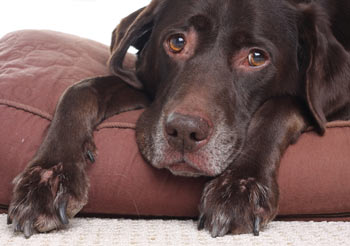Warning Signs of Cancer in Dogs

Cancer. When you have a dog, there's little that you fear more than hearing the veterinarian say your furry friend might have it.
But if you know the most common warning signs of cancer in dogs, you may be able to get your precious canine companion diagnosed sooner and give her a better chance of beating it.
Here, we highlight the top 11 warning signs of canine cancer.
Loss of Appetite
Whenever your dog stops eating or has a drastic decrease in appetite, she needs to be seen by a veterinarian right away. Many types of cancer cause problems with numerous body systems. Any of these can leave your dog not eating due to pain, nausea, or metabolic disturbances.
Please note: the signs of illness mentioned in this article can all mean something other than cancer, as well. It's important that you make a prompt appointment with your veterinarian to obtain an accurate diagnosis.
Rapid, Unexplained Weight Loss
Even if your dog was overweight to begin with, if she suddenly starts losing weight when you haven't changed anything about her diet and exercise routine, you should be concerned. Cancer alters the way nutrients are used in the body, and weight loss is common with many types.
Non-Healing Sores on the Skin
Cancers of the skin often look like small lumps or bumps. However, if there is an area on your dog's skin that started out looking like a scrape or scratch, became open and oozing, and hasn't healed in a reasonable time period, you should visit the veterinarian. This could be a sign of skin cancer.
Foul Odor
A bad odor from anywhere on your dog may be a sign of cancer. Bad breath could indicate oral or internal cancer, rear end odors could be a digestive tract or rectal problem, and skin odor could be skin cancer. If your dog has a foul odor with no obvious cause, make an appointment with your veterinarian.
New Bumps or Swellings
Many times, cancer in dogs appears as abnormal growths on the body. While this may occur internally, rendering it invisible, it can happen on the skin, too. Have any new growths checked out by your veterinarian. Some internal abdominal tumors can eventually cause a visible swelling of the abdomen, as well, so have that checked out right away if you notice it.
Lameness
If your dog begins limping or holding up a paw, you should see the veterinarian right away. While there are many causes of lameness, one of them is cancer, especially osteosarcoma. Your veterinarian may be able to determine why your dog is limping during a thorough exam, but x-rays may be required if he or she is concerned about cancer.
Difficulty Eating and Excessive Drooling
If your dog tries to eat but seems to have trouble, rolling the food around in her mouth or allowing it to drop out, it may indicate an oral tumor. Excessive drooling usually occurs with this condition, as well.
Tiring Easily
If your dog begins to show decreasing stamina, have her checked out. While it can be easy to attribute signs of slowing down to aging, there may be a bigger reason. The signs of cancer can be quite subtle, especially in the early stages, so it's important to bring any concerns, even those that seem minor, to your veterinarian's attention.
Coughing or Difficulty Breathing
If your dog is coughing or her breathing appears labored, it's important to get her an appointment with her doctor right away. While conditions other than cancer, such as heart disease, can cause coughing in dogs, it's important to check for lung cancer.
Changes in Urination or Defecation
If your dog begins urinating more or less than usual, straining to urinate, having diarrhea, showing constipation, or straining to defecate, have her looked at by her doctor. Any of these signs can indicate cancer, as well as many other conditions that should all be treated.
Personality Changes
You know your dog better than anyone. Spotting small personality changes such as being more aloof, clingier, or grumpier can alert you to a medical problem. Once you see a change like this, be sure to pay more attention to everything else: appetite, elimination habits, gait, etc. The more information you gather to deliver to your veterinarian, the easier it will be for him or her to make a diagnosis.
Final Thoughts
While no one wants to hear the word "cancer" in relation to their dog, it's important that owners not put their heads in the sand and ignore possible warning signs. Whether the problem turns out to be cancer or something else, the quicker it can be diagnosed, the better for everyone involved, especially your beloved dog.
You May Also Like These Articles:
How to Avoid Expensive Veterinary Bills for Your Dog
10 Ways You Could Be Shortening Your Dog's Life - Slideshow
Causes of Frequent Urination and Urinary Accidents in Dogs
Causes of Lameness in Dogs: An Overview
Dog Neutering: Is Earlier Better?
Mutts: Mixed Breed Dogs and Why They're Great - Slideshow
Disclaimer: This website is not intended to replace professional consultation, diagnosis, or treatment by a licensed veterinarian. If you require any veterinary related advice, contact your veterinarian promptly. Information at DogHealth.com is exclusively of a general reference nature. Do not disregard veterinary advice or delay treatment as a result of accessing information at this site. Just Answer is an external service not affiliated with DogHealth.com.


